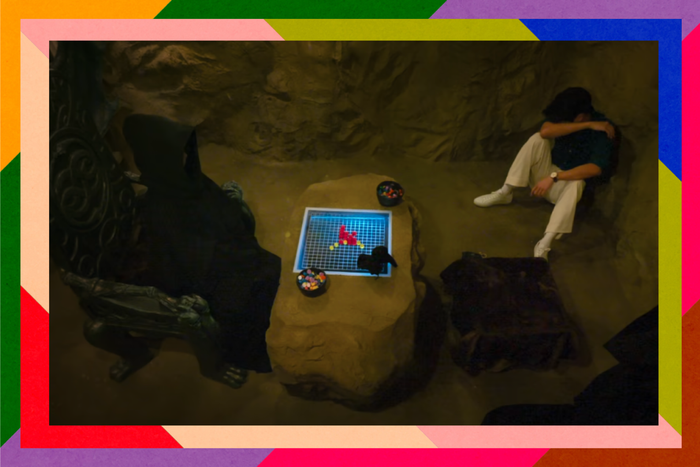Netflix and the Global Rise of K-Reality

Photo-Illustration: Vulture; Photo: Netflix
Reality TV in 2023 gave us the nuclear-grade #Scandoval, but it also supplied a niche moment so metal it made me yell at the screen over a board game. It comes late in The Devil’s Plan, a Korean reality competition that sees 12 participants partake in a series of unabashedly cerebral challenges while living on a Big Brother-style set. Two episodes before the finale, actor Ha Seok-Jin, who’d been ostracized by almost every other contestant throughout the season, breaks down in tears after a pivotal match of Go. His opponent? Artificial intelligence, physically represented as a life-sized ghoul. The setting? A chamber hidden in the jail cell where the two lowest-ranking players in each round are locked up overnight. The stakes? A chance to blow up the game and win the whole prize (₩500 million, around $300,000). Does all that sound bonkers to the average American television viewer? Probably. But as Seok-Jin crumples to the floor, flushed with exhaustion and triumph, it’s hard not to marvel over the visceral human emotion extracted by this strange reality show. There’s nothing else like it.
… except there is. The Devil’s Plan is part of an expanded K-reality slate including Physical: 100 (also very metal), Siren: Survive the Island (ditto), and more seasons of the dating show Single’s Inferno (oddly enough, same) released by Netflix in the past year. These shows — far more erudite, complex, and, well, respectful than most American reality offerings — arrived as part of Netflix’s massive investment in South Korea-produced shows as the streamer looks to capitalize on Korean media’s global popularity and the runaway 2021 success of its own Squid Game. It should go without saying that K-reality is already vastly popular elsewhere in the world, particularly within East Asian and Southeast Asian markets, but its growing stature on Netflix raises the possibility of K-reality crossing over into the American mainstream. Even if that doesn’t happen, the genre’s very presence on the platform, nestled between Love is Blind and Selling Sunset, already brings a different kind of value. By virtue of accessibility, Netflix’s K-reality slate offers American viewers a reminder of all the other ways reality television can be.
The Devil’s Plan wasn’t the streamer’s most-watched unscripted Korean show in 2023. That distinction belongs to Physical: 100, a reality competition defined by sweat, grunts, and near-geological musculature that debuted back in March. Running 100 supremely athletic individuals through a series of intense physical challenges is pretty much the definition of hardcore. Yet for a production that opens on an ominous room filled with the faithfully rendered plaster torsos of all its participants and includes contests like “hang from the ceiling for as long as you can,” Physical: 100 is closer in spirit to The Great British Bake Off than American Ninja Warrior. The edit emphasizes a sense of warm camaraderie among its participants, seeming to draw from the more welcoming corners of bodybuilding culture. Despite competing in a zero-sum game, the athletes — men and women, mostly Korean but not entirely, all hailing from different schools of physical proficiency — almost exclusively cheer for each other. They admire each other’s bodies even as they size up the competition. When they’re eliminated, they respond to the symbolic instruction to destroy their own plaster torso in all kinds of surprising, human ways. Some are humbled. Some are rueful. Many are clearly pissed, but they’re restraining themselves. It’s easy to imagine a more emotionally simplistic version of the show, one defined by wanton displays of idiotic male aggression. But in Physical: 100, the emotions are subtle and complicated. They feel real.
Single’s Inferno, the first K-reality show to top the streamer’s Global Top Ten List when it debuted in 2021, captures a similar emotional subtlety. A dating show in the lineage of Love Island, Inferno tosses a bunch of hot singles on an island campground where they mingle, flirt, and compete in challenges — often very physical, with lingering shots on the men’s torsos — for the chance to spend more time mingling and flirting with the target of their desires. Oh, and they’re also trying to match up so they can spend a night together in a luxury hotel. It’s fun, breezy dating show stuff, but the particular delights of Single’s Inferno lie in the sheer awkwardness permeating these interactions. Listen, these individuals are hot. Yet they’re often hung up on what another person is thinking, which signals are appropriate to act upon, and the best way to present themselves. When there’s an exception, as in the case of the overconfident Lee Gwan-Hee on the season currently rolling out, the contrast only amps up that awkwardness. Unlike anything from The Bachelor or Too Hot to Handle, open conflict is rare between peacocking suitors. There’s still delicious friction driving Single’s Inferno’s festivities; that heat just gets to simmer beneath the surface for much longer. When a challenge arrives to serve as a release valve (like, say, a literal wrestling match), the emotional outburst packs a harder, often funnier punch.
It’s not all emotional subtlety, of course. Siren: Surviving the Island celebrates guts-and-glory warfare by design. Six teams of four women, all grouped by professions (stunt people, Olympians, cops, etc.), meet on a forested island where they face off in what is basically Capture the Flag on ’roids. Much like The Devil’s Plan, Siren runs on several overlapping game systems. Bases are scattered around the island, each possessing different advantages and drawbacks. There is a currency mechanic, in which teams burn calories to earn points they can spend on improving their bases. The competition plays out in different phases, toggling between core “Base Battles” and Survivor immunity-style challenges. It’s excessively complicated, and the complexity often prevents seamless narrative flow. But patience delivers. Where Survivor is a social game masquerading as a survival show, Siren is closer to straight-up combat. In one memorable sequence, a lone defender uses her weight to prop a bed against a door as the combined weight of two opposing teams descend upon the rickety cabin serving as her base. Windows shatter, bodies pile onto each other, a painful scuffle ensues. Siren presents the scene almost naturalistically, shifting through a combination of bodycam, surveillance, and camera-crew footage. The result causes your brain to fall into a fascinating interpretive space where it forgets you’re not watching fiction — but it’s not actually real, either. It’s a whole other layer in the synthesis of what’s “real” and what’s produced that defines reality television.
Like all media cultures around the world, K-reality has its own baggage. Physical: 100 wrapped its season under a shroud of overlapping controversies, including a finale rife with accusations of producer manipulation and a few contestants whose troubling backgrounds emerged afterward. Siren’s militarism affords a vivid aesthetic, but its underlying fascination with various forms of state power is disconcerting. With Single’s Inferno, one could write a treatise on the more-same-than-not standards of physical beauty the show elevates, and how that mirrors or differs from American television. More broadly, it would be ahistorical to single out K-reality as an example of Netflix’s expanding reality-TV interests without evoking Terrace House, the Japanese reality show made available on the streamer in 2015 that became a cult sensation among pockets of American viewers. (That is, until the franchise was placed on indefinite hiatus following the suicide of a cast member. Again, every television culture comes with its own baggage.)
Yet Netflix’s expansion into financing reality TV from different media cultures isn’t just valuable in some token “diversity” sense. It allows for vastly different and interesting experiences within a genre beloved for all its glories and flaws, thus opening it up the form to different possibilities. The question is whether Netflix’s direct production of K-reality, which gets its ineffable qualities from the culture that produces it, will ultimately result in some “Westernization” of the genre. Given the globalizing nature of Netflix as a platform, and the centralization of its ever-growing power in the United States, it’s not a stretch to imagine corporate tastes trickling down from the Hollywood C-suite, flattening the K-reality slate into Netflix’s overarching content aesthetic. (Surely you must have wondered why so many of the streamer’s originals look the same.) We don’t seem to be at risk of that quite yet; speaking about the adaptational possibilities of Physical: 100, Netflix’s VP of Unscripted Brandon Reigg told my colleague Joe Adalian, “Part of the brilliance and joy of that show is there was something uniquely Korean about it and I don’t know if we would be able to capture that same essence in the U.S. version. But never say never.”
Of course, K-reality shows have been localized in Western countries for a long time; Fox’s The Masked Singer is an adaptation of a K-reality hit called King of Mask Singer and The Devil’s Plan is a pseudo-remake of an older K-reality competition show called The Genius, the Dutch version of which ran on the country’s public broadcaster. But we’re increasingly living in Netflix’s world, and the streamer has ambitions for further global domination. In the unscripted realm, this has manifested in Netflix spitting out various localizations of its reality franchises — taking what works here and trying to make it work there. Love is Blind has two non-English-language spinoffs, one in Brazil and one in Japan, with a third based in Sweden premiering next month. The Circle has French and Brazilian incarnations, supplementing its core American and British versions. We haven’t yet seen efforts to take what works there and flatten it down to work everywhere. But after Netflix took Squid Game, the stridently-anticapitalist-K-drama-turned-global-phenomenon, and turned it into vociferously pro-capitalist American reality television show, don’t count on Netflix committing to restraint.




